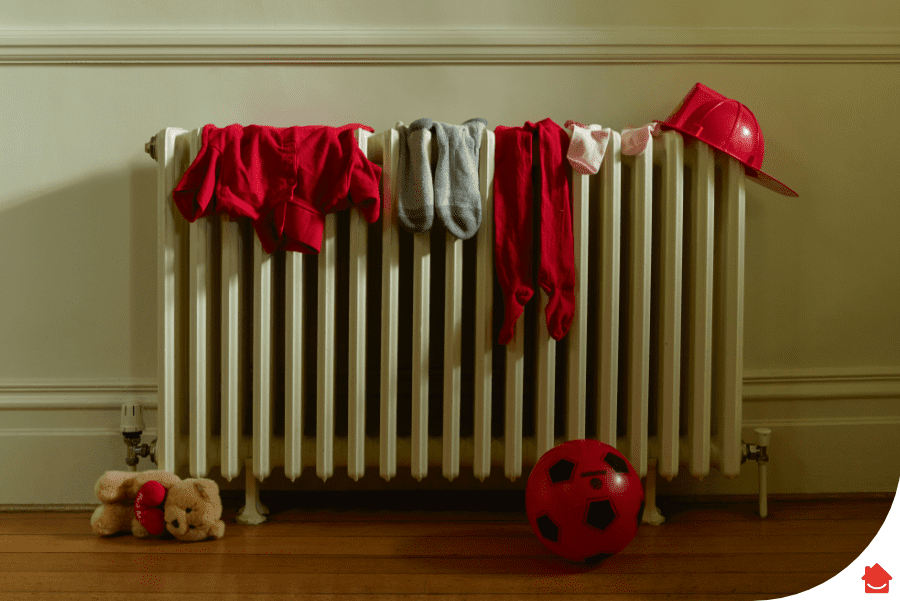Home heating advice
Why is my radiator making noise?
11 Oct 2021 • 5 minutes


If your radiator’s making noise – whether it’s banging, clicking or gurgling – it can be a big pain. But no worries! There are a few predictable reasons why it makes certain sounds and, depending on the type of noise, and you can probably put things right yourself with the right tools.
No one wants a noisy radiator, so this troubleshooting guide will help you get to the bottom of your loud and obnoxious household friend. You don’t need much DIY experience, so dig into the following information and you can fix it without having to call out a plumber.
To protect yourself and your home against current or future issues, HomeServe offers boiler cover and heating breakdown insurance you can rely on.
Radiators can get a little loud from time to time and there can be a number of reasons. This following guide will help you pinpoint your radiator’s particular problem and find the answer to your issue.
A gurgling noise is a very typical sound to hear coming from your radiator. It’s actually one of the most common issues people have in their central heating system, and is usually caused by trapped air bubbles.
There’s a lot of water being pumped around your pipes and radiators throughout your property, and over time air bubbles appear. If the trapped air builds up significantly, it can cause those bubbling, gurgling noises – and also the odd cold spot in your radiator if there’s enough of a build-up.
Touch the top of your radiator – does it feel colder at the top than the bottom? If it does, it means a trapped air bubble is preventing the hot water from getting around to all four corners of your radiator. This is creating an inefficient system. What’s the answer? Bleed your radiators.
Gurgling is most commonly caused by air bubbles in the heating system and can usually be resolved by bleeding your radiators. Use a radiator key to loosen the bleed valve on each radiator. Once the system has heated up, wait for all the air to escape before closing the valve again.
Top tip: you’ll need an old towel handy to mop up that water.
Our full guide to how to bleed your radiators will help you along step by step.
Ever heard of boiler kettling? Dry boiler kettling is something that happens mostly in hard-water areas like London and the South East, where limescale is much more common. Over time the limescale and sludge builds up in your central heating system, potentially blocking the pipes to your radiator.
When this happens, a rumbling noise (like a boiling kettle) or even a banging noise starts to occur. Like a ventriloquist’s dummy, it might sound like the banging is coming from the radiators, however it’s actually coming from your boiler.
This is because the limescale build-up is restricting the flow of water to the boiler’s heat exchanger, which causes overheating and steam, contributing to the unmistakable ‘kettling’ sound.
Depending on the severity of the problem, you can do a couple of things before you need to call a Gas Safe engineer to potentially clean or replace the boiler’s heat exchanger.
Something you can do right away to clear away built-up sludge in your system is to drain your central heating. You can easily do this yourself by following a few simple steps, our guide to How to drain your central heating system will teach you all you need to know. You’ll need to buy a few tools to follow each step, but you’ll have a cleaned-out system once you’ve done it. Consider adding some radiator inhibitor when you refill the system too, which helps guards against sludge and limescale build-up.
You might be thinking ‘why does my radiator make a clicking noise?’ If your radiator is clicking (it can also sound like a creak or a groan), this could be caused by the metal frame of the radiator expanding and contracting as it heats up or cools down.
Well, you may find that these noises only occur when the heating is first coming on or going off. This is because when the heating comes on and hot water is pumped around your central heating system, it makes contact with the cold metal of your radiator and the metal begins to warm up and expand. It’s the expanding metal that’s making the clicking or creaking noise. When you turn the heating off again, the water cools and the metal also cools and contracts.
Nothing. Unfortunately, a clicking or creaking radiator is pretty normal and there’s not much you can do about it
Whether the noises are new or you’ve lived with them for a while, and you’ve tried the above remedies, you can always call us in an emergency for a one-off repair. We’re working with BOXT, who can install a new, energy-efficient (and quieter) boiler in no time. You can also choose from our range of boiler cover and heating breakdown insurance for added peace of mind over the entire year.
Depending on the particular noise – gurgling, banging, clicking – there are a few reasons, including trapped air and a build-up of limescale, that can be fixed at home with a few simple tools.
Depending on what kind of noise your radiator is making, there are a few fixes you can do yourself, including bleeding your radiators and draining your central heating system.
Not necessarily. If it’s just creaking or clicking when your heating goes on or off, it’s just the metal of the radiator expanding and contracting. If it’s gurgling, banging or sounding like a kettle, there are a couple of home fixes you can do yourself.
Our help & advice articles cover Plumbing, Home heating, Electrical, Energy-saving and Home maintenance.